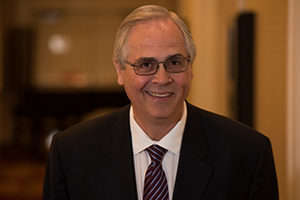Johnson: GSA testbed of energy efficiency, savings
Host Roger Waldron is joined by Martha Johnson, administrator for the General Services Administration. December 13, 2011(Encore presentation December 27, 2011)
wfedstaff | June 4, 2015 3:00 pm
By Jolie Lee
@jleewfed
Federal News Radio
The General Services Administration wants to be the “proving ground” for green technologies in government, said GSA Administrator Martha Johnson.
“Because GSA is a big player, we can actually make or move a market by a decision we make. You can do that just inadvertently or you can do it intentionally … We think we should do it intentionally,” Johnson said in an interview with Off the Shelf host Roger Waldron. (Off the Shelf airs Tuesdays at 10 a.m. on Federal News Radio.)
GSA’s far-reaching mission includes an inventory of 180 million square feet of office space and 220,000 vehicles. In 2009, the agency received $4.5 billion in Recovery Act funds to green its buildings and $300 million for fuel-efficient vehicles.
The agency has for some time “picked the low-hanging fruit” in energy-efficient savings but the Recovery Act funds allow the agency to take these initiatives to the next step, Johnson said.
The agency is in a unique position to try out different green technologies because it has buildings in locations of varying conditions and climates. The challenge is finding out how these small projects scale to the rest of government.
For example, GSA is working on “smart building” sensor technology that adjusts heating and lighting based on the number of people in a building.
“Think of it as a big box open for business, and every morning at, say, 8 o’ clock, four or five hundred little heaters walk into the building,” Johnson said.
GSA also has purchased 116 electric vehicles, which has also started the conversation on where to install charging stations.
“We can have a big effect if we can make each small decision well,” Johnson said.
The initiatives fit into a larger goal to have a net-zero environmental footprint.
“It’s a moonshot for us,” Johnson said. “It forces us into disciplines, debates, measures and programs that will very critically watch our resources.”
She added, “When in government, you do not want to waste taxpayer dollars.”
Green as a business strategy
GSA is leading an effort by the administration to encourage the use of Energy Savings Performance Contracts over the next two years. With ESPCs, agencies partner with private sector energy service companies to develop energy upgrade projects. The cost of the upgrades are paid for over time by the savings the projects produce. The President signed a memo that directs agencies to commit at least $2 billion to these projects.
“These arrangements pay for themselves. This is a free lunch,” Johnson said.
GSA is also an early government adopter of cloud computing. In June, GSA became the first agency to move its entire workforce to the cloud for email.
“Unlike the private sector, (the government) is proliferating data centers, rather than consolidating them. It’s like rabbits; they’re just going up all over the place,” Johnson said.
These centers have become both an environmental cost and a real dollar cost to maintain. Data centers are built for peak use, which means “there’s a lot of idle capacity,” she said.
“The cloud is a terrific way for us to find real economies of scale, efficiencies and reduce our huge data center footprint. We’re pumping on that front,” she said.
Serving other agencies
Johnson predicted 2012 will be “one of the most challenging years” for GSA because agencies — its customers — are also challenged by budget constraints.
GSA is now faced with a line of customers asking, “Can you help?”
Agencies cannot expect a silver bullet to save money. “It’s a silver buckshot,” she said.
Some savings require upfront investments, whether it’s moving to a smaller office space or switching to a more fuel-efficient vehicle fleet, Johnson said.
Other savings require coordination — like using strategic sourcing in the acquisition process.
“Our slogan this year is, ‘More for mission,'” Johnson said.
RELATED STORIES
Obama commits to $2B in energy upgrades to federal buildings
Tight budgets could spur agencies to be innovative, take more risks
Copyright © 2024 Federal News Network. All rights reserved. This website is not intended for users located within the European Economic Area.







